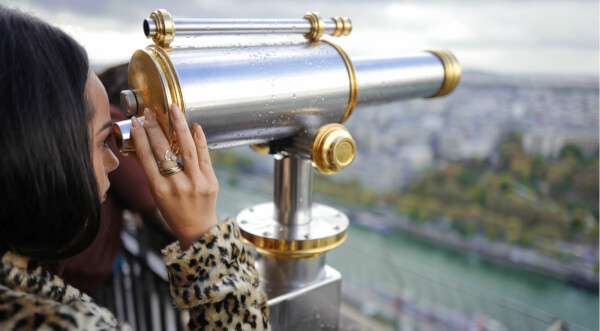Having a baby in the UK? Hospital, midwife, delivery and IVF costs
If you’re expecting a new baby, you’re probably experiencing a range of emotions - excitement, apprehension, joy, and confusion. If you’re a visitor or expat...

Dubai offers a high standard of living to expats, who flock there for the opportunity to live and work in this rapidly developing economy. In fact, with a whole host of family friendly attractions, Dubai attracts everyone from highly paid execs, to young professionals, families and students. If you’re coming to Dubai to study, you’ll find that there are strong local universities such as the University of Dubai (UD), as well as a large number of campuses affiliated to other universities from around the globe.
The lifestyle on offer means that Dubai can be a fantastic expat destination, but it comes at a cost. Renting a one bedroom apartment in the city centre will cost, on average, €1766, or €1209 outside of the city centre. This puts it on a par with London - and means that renting in Dubai is some 60% more expensive than finding a home in Paris. Naturally, what you pay in rent will vary enormously based on location, and some people choose to swap the inner city for smaller outlying communities, where villas are more readily available.
In general terms, the rental market in Dubai is fairly well stocked and regulated. However, it can feel quite alien to a newcomer, and like anywhere there are unethical landlords and agents, so you should be wary. If you have any issues the government agency set up to help is the Real Estate Regulatory Agency (Rera), and they can offer advice and arbitration should you need it.
If you’re just making plans, it’s important to take into account all the costs associated with your move. Compare the cost of living in Dubai with that of your home town using a comparison site such as Numbeo, and check out this quick guide to renting in Dubai to find the perfect place for you.
Although there are several different options when it comes to housing in Dubai, what suit you will depend on your lifestyle and budget. Property options basically break down to villas or flats, both of which have their advantages and disadvantages. Villas, for example, will have more space and usually a private garden, but can be much more costly and time consuming to maintain. Apartments, on the other hand, can mean you have to compromise on space, but give you access to shared facilities such as a pool and gym, and tend to come with much lower utility bills.
Some real estate agents are specialists in specific areas of Dubai, so if you’ve narrowed down your choice of location, it’s worth checking if there’s a realtor with inside knowledge on your chosen area. The Dubai Land Department has a list of approved Dubai real estate brokers, which you should always use when looking for a realtor.
Agents will charge a fee for their services, which is usually around 5% of the annual rent of the property. However, some agents put their fees much higher, so make sure you know in advance what the charges are going to be. Also, some realtors will write a clause in tenancy agreements which means that you have to pay some form of fee every time the contract is renewed. This is something you can negotiate about, or move onto a new agent if you’re unhappy with the terms on offer.
The Dubai rental market is pretty active and well stocked. Lots of expats means that renting is common, and so, there’s a huge range of options. Options range from completely unfurnished places to others which come complete with all furnishing and services such as security and cleaning thrown in. It’s worth considering what you need in advance, as some areas will have a larger stock of one accommodation type. Therefore, the type of home you’re looking for is also likely to influence the location you end up in.
If you’re only in Dubai for a relatively short time, there are fully furnished short term rents available, although these tend to cost a lot more.
A notable difference about renting in Dubai, is that subletting in a place that’s already rented by someone else might cause you a problem. This is because the law frowns upon unmarried males and females living together. Dubai police tend to be pragmatic but it’s unlikely to be a huge issue for a foreigner, unless you find yourself in contact for the police for some other misdemeanor.
How you proceed is a personal choice, although Dubai is still a place where it pays to have a healthy respect for the law. All that said, there are lots of rooms available on Dubizzle if this is what you want to arrange.
If you’re coming to Dubai to study, most of the universities will be able to help with advice and support to help you find a place - especially as an international student newly arrived in the Emirate. Not all university campuses have onsite accommodation for students, however, so this might push your budget up a little for housing.
Naturally, where you choose to rent in Dubai will be largely dictated by the location of your job. It’s worth also taking into consideration the school you choose if you’re going to live in Dubai with kids, as traffic at peak times can be congested. Different communities in Dubai have very distinct characteristics, and your personal preferences, as well as your budget will dictate what’s best for you. As you might expect, in general terms, the further away from the heart of town you go, the more affordable the rents. So you can get more for your money if you’re prepared to have a bit of a journey into the city. However, some communities outside the centre have higher end prices because of their reputation or other facilities, so check out what you’re getting for your money before you commit.
The centre of Dubai includes many landmarks which are globally recognisable - such as the Dubai Mall (the largest and most visited on the planet), the Burj Khalifa (tallest building) and the world’s tallest hotel, Dubai’s JW Marriott Marquis. When it comes to a place to live, the most desirable places in Dubai tend to be close to the centre of all the action, and of course the beach. Jumeirah, which includes developments like The Palm and Dubai Marina are among the most popular with price tags to reflect this. Emirates Hills, a gated community named after Beverly Hills, is at the centre of several other distinct and attractive central communities, such as The Meadows, The Lakes and The Springs.
It’s worth considering what you want from your home in Dubai, as the centre of town offers fantastic activities, restaurants, shops and nightlife, but can be congested with traffic. And while most expats looking for a place in the centre of Dubai choose one of the more recently developed areas, you can also look at somewhere like Old Dubai if you want something a little different.
It’s possible to live outside of the Emirate of Dubai to reduce your housing costs significantly, in areas such as Ras Al-Khaimah. However, congested traffic in the city means that commuting times could be very long. Driving to the centre of Dubai from Ras Al-Khaimah as an example, will take one and a half hours each way in average traffic, making it a pretty steep price to trade off against lower housing prices.
A better choice might be one of the communities which are outside of the city, but not as distant. Arabian ranches, some half an hour drive time from the centre, is an option popular with expats, as it has a reputation for good design and is quite a large community in its own right. Prices, however, are correspondingly relatively high.
If you’re looking for student accommodation, then your best bet is to ask your university for their advice on reputable agencies, if they don’t provide on campus accommodation. Because flatsharing can prove problematic under local law, you should ask your university what they recommend within your chosen budget and location.
The best way to get a head start on finding a place to rent in Dubai is to look online. Make sure you choose a registered broker if you’re going through an agent on your house hunt. The Dubai Land Authorities have a list of approved brokers, and this is a good place to start when finding an agent. Great websites to find a house or apartment to rent include:
It can feel daunting if you’re just setting about finding the right place in another country and culture. Here are some of the things that can help you be more prepared.
Although Arabic is the official language of the UAE, English is actually the language most commonly spoken in Dubai. As such, you’ll find most accommodation offered online is available with English descriptions, and rental agents will usually speak English, often in addition to other major world languages. All of the agents and umbrella sites listed above are in English, and the laws around tenancy agreements and rent are also published online in English by the Dubai Land Authority.
When you agree to a property in Dubai, you should always ask for a contract in writing. This will also need to be registered to give you your full legal rights. Your contract will be agreed between you and your landlord, sometimes with a broker acting as an intermediary. There isn’t a standard contract, and as long as you comply with tenancy regulations you can tailor the contract terms to suit your situation.
You should know that it’s fairly common for landlords to ask for significant amounts of the annual rent upfront. Until recently it was the norm to be asked for the whole year’s rental costs in one go, or to be asked to make out a series of post-dated cheques which the landlord can then cash at various points during the year. This means you’re paying an entire year’s rent in only a very small number of installments. If you’re used to paying a monthly rent, this can feel very alien.
However, since more rental property has become available in Dubai over recent years, many landlords realise that to be competitive they must also be flexible with their payment terms. You might even find landlords willing to accept monthly rent, but make sure you tell your agent if this is an absolute necessity for you so they can negotiate with landlords on your behalf.
When you agree a rental, you’ll be given a blue tenancy contract by the broker. However, this isn't legally valid unless it’s registered with Ejari (which is the Arabic word for ‘my rent’). You can read all about the process in English, and register your tenancy online.
Although good landlords are the majority in Dubai, the rental market is changing rapidly, and like anywhere else, a growing market will attract its share of unethical owners and agents. Choose a reputable agent who is registered by Rera, and don’t hand over any money without getting a receipt and being clear about what it’s for. It’s not unheard of for scam agents to take the security money of a would-be tenant and disappear.
It’s good to know that landlords can’t just arbitrarily raise rents in Dubai. They must give tenants 90 days notice, and the new rent must be based on the rental index published every quarter by Rera. If you’re paying under the market rent for a similar property, your landlord can legally raise your rent according to a formula, which will gradually bring the rent back into line with the market. However, with rental prices on the rise in some areas, unethical landlords might still try to steeply hike their rents, in the hope that sitting tenants move out, allowing them to remarket the property at a much higher rental cost.
As long as your tenancy is properly registered you have strong rights in Dubai. That said, it’s always a good idea to try to solve any issues amicably in the first instance. However, if you have any problems you can’t resolve directly with your landlord, then Rera is the place to look. The Dubai Land Authorities have much of the information you’ll need in English to help you understand your rights and how to resolve issues like unfair rent rises.
Usually the deposit you have to pay will be in the region of four weeks of rent. However, unlike some other countries, this might have to be given to the agent when you reserve the property.
Because you’re handing over payment before moving in, you need to make sure you’re protected. Both the blue contract from, which you'll be given at the point of making the reservation by your agent, and the Ejari record you'll get when you register your tenancy, should include a record of the deposit that you have paid to the landlord. Naturally, you must also make sure you use a reputable broker and get a receipt.
If you’re just planning your move to Dubai then you might find that you need to make a deposit payment before you have opened a local bank account, or even arrived in the country. If you do, it’s worth remembering that your home bank might not offer the best value when it comes to making an international money transfer. Often banks will add hidden fees by using a poor exchange rate, even with their own account holders.
To get the best deal possible, consider using an exchange service like Wise to make your payment directly to your new landlord or agent. Wise applies the same mid-market rate you’ll find on Google, and the charges the lowest possible fees.
Be wary of common scams, such as properties offered for rental without proper contracts, or landlords or agents who ask for fees for a service you don’t want or need. However, the good news is that the rights of a tenant renting in Dubai are well protected by law. Make sure that you register properly with Ejari to get your full rights. This is simple, and you can even register your tenancy online.
Renting in Dubai is something of an adventure - not least because of the dizzying array of choices open to new arrivals. It’s worth getting to know the area a little before you commit to a property, and using a reputable agent if your budget allows. The system isn’t hugely complex but can feel alien to a newly arrived expat. However, if you take some local advice and are clear on what you want from your new pad, you’ll find your dream place in Dubai in no time. Good luck!
*Please see terms of use and product availability for your region or visit Wise fees and pricing for the most up to date pricing and fee information.
This publication is provided for general information purposes and does not constitute legal, tax or other professional advice from Wise Payments Limited or its subsidiaries and its affiliates, and it is not intended as a substitute for obtaining advice from a financial advisor or any other professional.
We make no representations, warranties or guarantees, whether expressed or implied, that the content in the publication is accurate, complete or up to date.

If you’re expecting a new baby, you’re probably experiencing a range of emotions - excitement, apprehension, joy, and confusion. If you’re a visitor or expat...

Are you pregnant? Congratulations - this is one of the most exciting periods of your life. But if you’re living abroad as an expat, visitor, or non-resident...

Dubai is one of the most exciting and fastest-growing cities in the world, leading the globe in all kinds of innovation. In Dubai, bigger is better, and it...

If you’re looking to get in touch with someone in the UK, often your phone is the quickest way to do it. But you want to make sure you’re not calling the...

Whether you’re a non-resident UK citizen or a citizen of another country living in the UK, you’ll need to get clued up about UK taxes. UK non-resident tax...

Home to some of the world’s best museums, restaurants, sports teams, and universities, there’s no doubt that moving to the UK to work, study, or just to have...